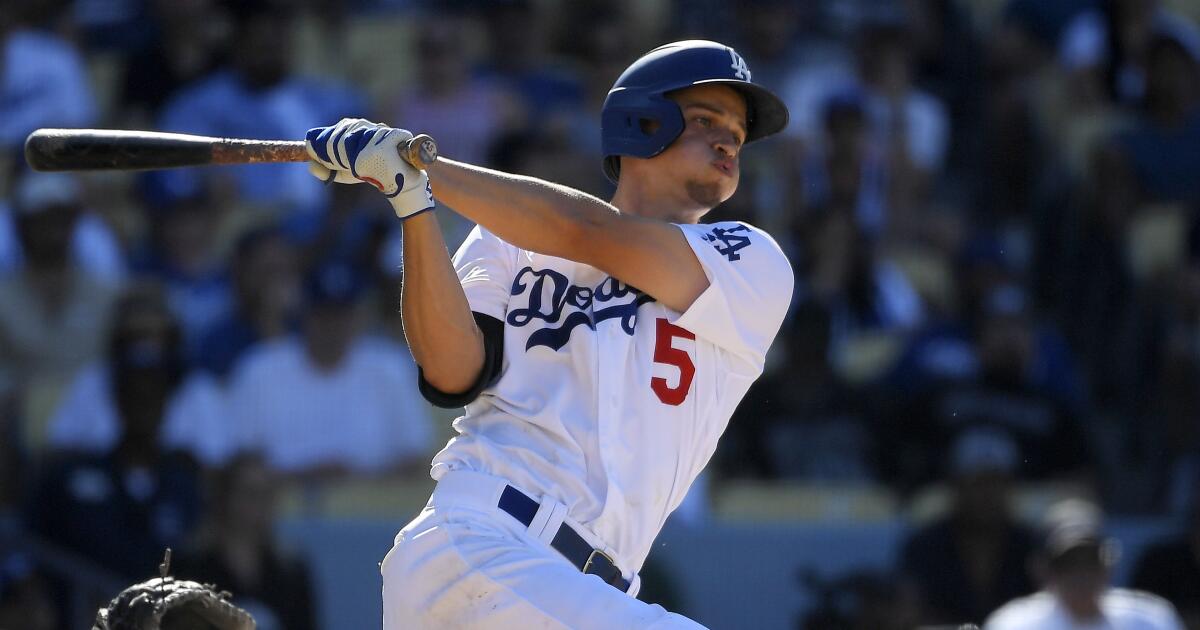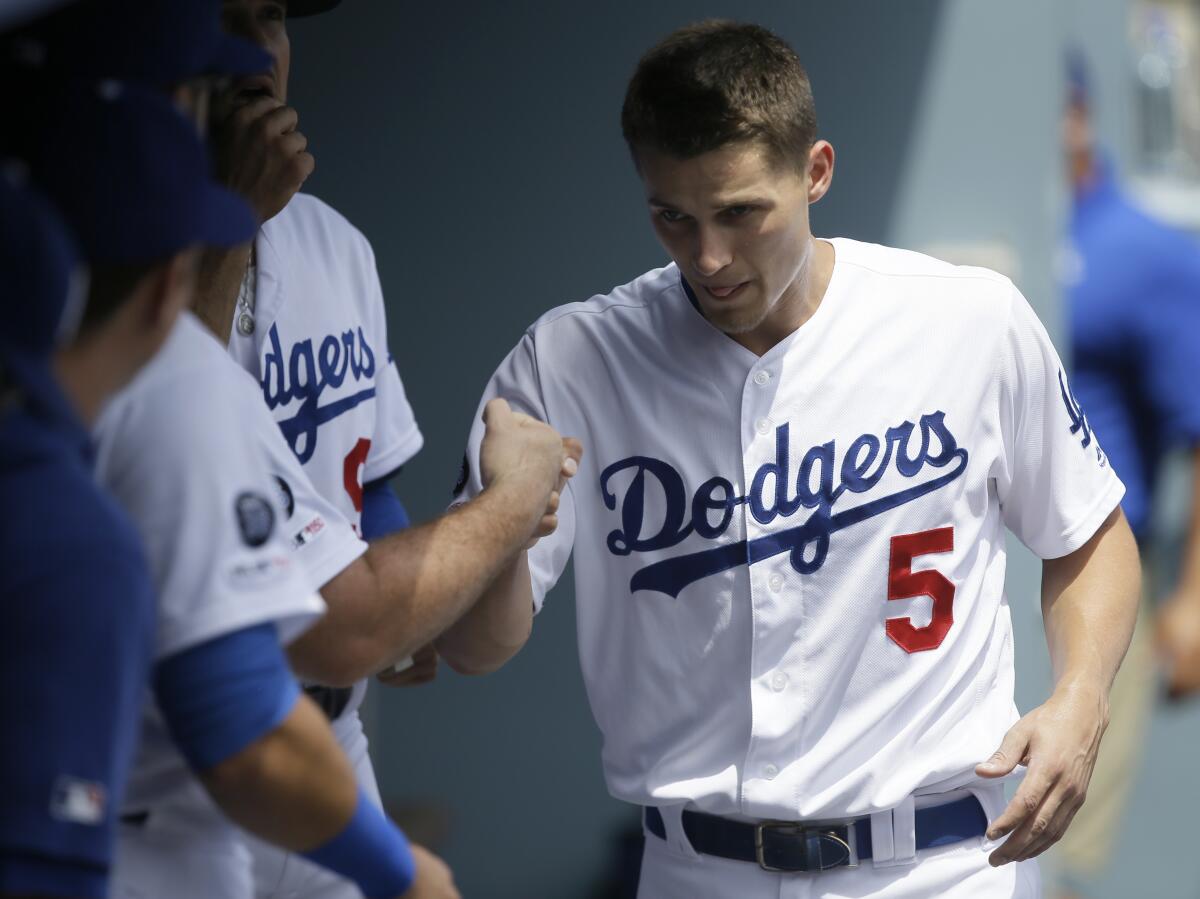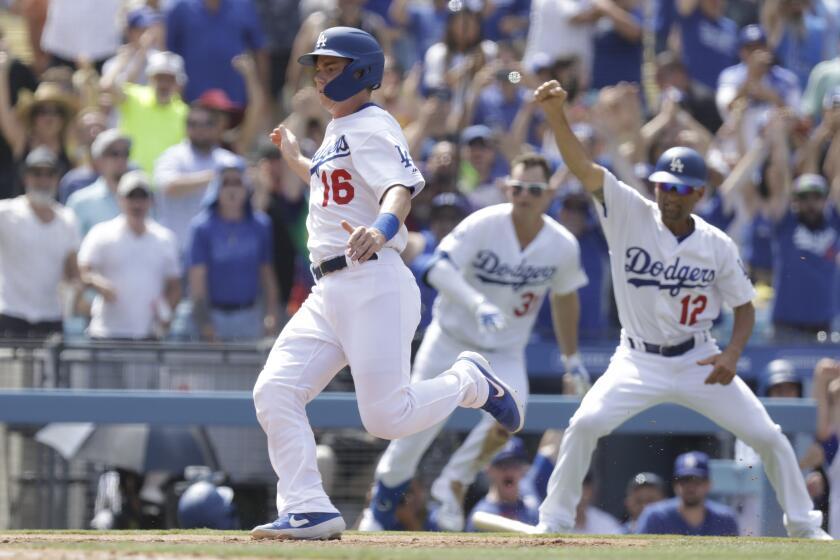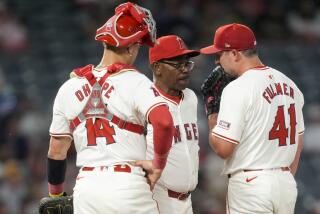Column: Dodgers’ Corey Seager turns irritation into motivation as he tries to reclaim form

- Share via
The levity in his voice offset the gravity of his words.
He described this season as “extremely tough,” except he didn’t sound frustrated.
On the contrary.
As he explained the difficulties of returning to the Dodgers lineup after missing all but the first month of last season, Corey Seager projected a sense of … excitement?
The former rookie of the year smiled. He laughed. He playfully wiggled the black bat in his hands.
Seager will enter a weekend series against the Arizona Diamondbacks batting a career-worst .265 with nine home runs, but if you ignored what he said and listened only to how he said it, you would think he was a triple-crown contender.
Which makes sense.
Seager, 25, views this as a transitional period, something to be endured. He believes that so long as he remains healthy and continues to accumulate at-bats, he will hit again. He always has.
Russell Martin’s two-run single with two out in the ninth gave the Dodgers a 2-1 win over the Cardinals in the latest in a season full of walk-off heroics.
“Absolutely,” he said.
The possibilities are intoxicating. As many games as the Dodgers have won, as large as their lead is in the National League West, as many runs as they have scored, perhaps their most talented player is still working his way back from two major operations. Imagine if the version of Seager who was an All-Star in his first two seasons is added to this lineup.
Others had warned Seager this year would play out like this. He underwent reconstructive elbow surgery in May of last year. He later had a procedure to repair a troublesome left hip. He missed the last five months of the regular season, as well as all of October.
Before the injuries, manager Dave Roberts said Seager used to take swings in the batting cage “until he felt absolutely perfect.” If anything, his workload was a subject of contention between him and management. To go from that to nothing at all was a shock to his system.
When Seager made his long-awaited return on opening day, he didn’t feel entirely right.
“It was weird,” he said. “It felt natural, but it wasn’t what you did before. You remembered what you did, you remembered your thought processes, you remembered all of the things you did before and you tried to do that and you were just not in the same spot, you were not doing the same thing.”

He also had to become reacquainted with his body, which included a new elbow ligament and a more flexible hip. Advanced metrics show that Seager’s range and efficiency at shortstop is nearly where it was in 2017.
“My hip has been noticeably different in just the fact of having more range, having more flexibility,” he said. “It’s been trying to learn those new ranges, learn those new positions I can get into and how to manage that position.”
Seager batted .225 through May 11.
“So there’s definitely times you got upset, irritated, fighting yourself, almost,” he said.
Seager recalled how Adrian Gonzalez used to help the Dodgers win games late in his career, how Gonzalez would do what was necessary to score a runner from third base instead of hunting for a base hit. Seager adopted a similar mindset at times.
What helped was the team’s win-loss record. The team’s offensive firepower allowed Roberts to take pressure off Seager by moving him around in the lineup.
In mid-May, everything started to click again. Over a 26-game stretch from May 12 to June 11, Seager batted .354 with six home runs and 26 runs batted in.
“It was comforting to know you could do it again, you know?” he said.
But Seager then strained his left hamstring rounding third base in a game against the Angels. He’d torn the same hamstring in 2013, his first full season in the minor leagues.
“That one was really hard for me, more mental than physical,” he said. “I finally got past not being in rehab mode, where I was worried about my body, worried about having to get everything completely ready, finally going and then having to basically start back over and do the rehab process again. It was difficult.”
He missed the next month. And since returning from the injured list in mid-July, he has batted a modest .227. His on-base-plus-slugging percentage for the season is .773, significantly lower than his .868 OPS through 2018.
Rookie Dustin May pitched well in his second Dodgers start, and Russell Martin hit a walk-off single in a 2-1 win over the Cardinals.
Shortly after Seager was promoted to the major leagues as a September call-up in 2015, the aforementioned Gonzalez said he could see him in the Hall of Fame one day. Seager made Gonzalez’s words sound prophetic, making the All-Star team in 2016 and 2017. He was considered one of the game’s top all-around talents.
Problems started with a back injury late in 2017. His experiences since then have confirmed what he already knew, that staying on the field is as much a component of a Hall of Fame career as ability.
“I think I’ve always had that appreciation,” Seager said. “It’s just gotten more now. You always understood how hard the game was, how incredibly difficult it is to show up every day and be productive. Watching guys like Gonzo at the end of his career doing the little things like I was telling you. Those little things add up over the years, and that’s where the numbers come from and that’s what he was so good at.”
Dealing with injuries over the last year or so has forced Seager to work more efficiently, which has eliminated his disputes with management.
“We’ve seen Corey work a lot smarter,” Roberts said. “He understands that quality over quantity is not just a sign that someone came up with. It’s just growth.”
Not that it was by choice.
“Obviously, going through your rehab, you can’t just do whatever you want to,” Seager said. “There’s numbers, there’s limits. You get 40 [swings] today, you get 50 tomorrow. Working like that through a whole year, you kind of ... you didn’t become comfortable with it, you just kind of accepted it.”
Roberts has also given Seager more breathers than he has in the past, holding him out of the lineup on occasion to ensure he doesn’t return to the injured list.
Seager understands. When he played in the 2017 World Series, he did so after missing the NL Championship Series with a back injury. He didn’t come anywhere near the field in the World Series last year.
“My main concern is just keeping him healthy,” Roberts said.
Because, like Seager, the manager is convinced that if he remains healthy and continues to accumulate at-bats, he will hit again. He always has.
More to Read
Are you a true-blue fan?
Get our Dodgers Dugout newsletter for insights, news and much more.
You may occasionally receive promotional content from the Los Angeles Times.










